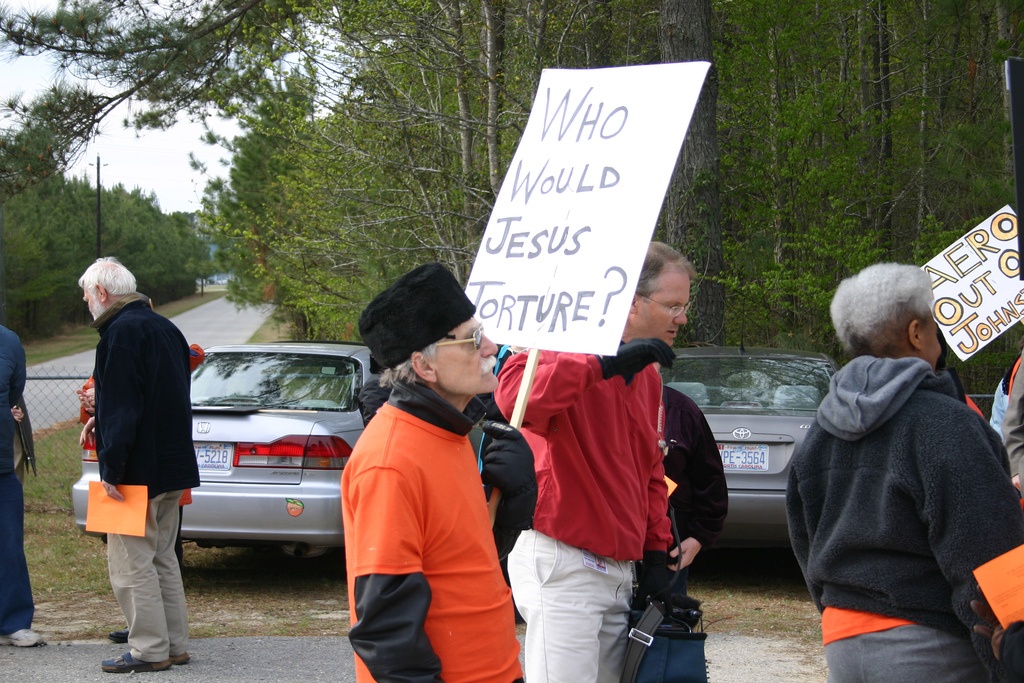Putting a face on North Carolina's role in the U.S. torture program

In 2007, protesters gathered at the airport in Smithfield, North Carolina, to protest its use by the U.S. torture program. This week, the N.C. Commission of Inquiry on Torture will hold two days of public hearings in Raleigh to confront the state's involvement in human rights abuses. (Photo by David Biesack via Flickr.)
Donald Trump supports the U.S. government's use of torture against suspected terrorists. After a terrorist attack in Belgium last year, for example, Trump told CNN that the suspect would have talked "a lot faster with torture." Days after being sworn in, the president repeated the incorrect claim that torture "absolutely works." And after this month's terrorist attack in New York City, Trump tweeted that he "would love to send the NYC terrorist to Guantanamo" — a reference to the infamous military prison at Guantanamo Bay, Cuba, where the U.S. government brutally tortured hundreds of people who were later released without ever having been charged with a crime.
It's in this political climate that the North Carolina Commission of Inquiry on Torture (NCCIT) will hold two days of public hearings in Raleigh this week. Featuring testimony from human rights activists and experts, religious leaders, politicians, intelligence officials, victims of torture and their families, the hearings aim to force North Carolinians to confront their state's involvement in the Bush administration's torture program and to prevent the same mistakes from happening again.
"We have a president who's openly talked about bringing back some of these tactics," says Catherine Read, the executive director of the NCCIT. "We needed to air publicly what was known about the program, and also the damage that the program did."
In 2005, the New York Times revealed that the tiny airport in the Johnston County community of Smithfield, about 30 miles southeast of Raleigh, was a "major domestic hub of the Central Intelligence Agency's secret air service." In 1979, the CIA had established an aviation front company there called Aero Contractors. When the Bush administration launched the so-called "War on Terror" in the early 2000s, the airport became a major stop for the CIA's "Rendition, Detention, and Interrogation" program that shuttled detainees and agents between foreign countries, the U.S., and Guantanamo Bay.
According to the NCCIT, there have been 44 documented cases in which North Carolina-based jets, pilots, and crews delivered detainees to secret sites where they were tortured, suffered brutal beatings, and were denied access to a lawyer or phones to contact their families.
"I was just like, 'Holy crap.' Here's this awful thing that's originating in our county and people I knew were involved in it," says Allyson Caison, a real estate agent in Johnston County.
Sometimes the rendition teams carried out the torture on the plane itself. On one Aero flight between Thailand and Libya, for example, Fatima Bouchar — a pregnant woman whose crime was opposing Moammar Gadhafi, a leader whose regime the U.S. helped to topple less than a decade later — was "forced onto a stretcher and had tape wound around her body from her feet to the top of head, with one of her hands pressed tightly against her womb," according to the U.K.-based Rendition Project. "As the tape was wound around her face, her right eye was taped open and kept that way for the duration of the 17-hour flight, which she describes as agony."
Though Bush administration officials defended the torture program as necessary to protect Americans, it was a failure. The vast majority of those detained at Guantanamo Bay without a fair trial were eventually released by Bush or Obama — "not because the court compelled them, but they just realized they had the wrong guys," says NCCIT Co-Chair Frank Goldsmith, a civil rights lawyer based in Marion, North Carolina, who represented inmates at Guantanamo.
According to Human Rights Watch, 731 out of the 780 known detainees at Guantanamo have been released without formal charges. Of the 41 detainees left there, just seven face formal charges. To date, only eight prosecutions of Guantanamo detainees ended in a conviction, but three of those eight were eventually overturned.
The torturer next door
The revelations about Aero and North Carolina's involvement in the U.S. torture program came as the public mood was starting to turn against the wars in Iraq and Afghanistan, giving birth to a local protest movement.
Allyson Caison, a real estate agent who lives in Johnston County, got involved in the movement in its early days. She was shocked to discover through her research that two of Aero's principals were her neighbors — people for whom she made gingerbread houses at Christmastime.
"I was just like, 'Holy crap,'" says Caison, who will be providing testimony from a Johnston County perspective at the hearings. "Here's this awful thing that's originating in our county and people I knew were involved in it."
In 2005, Christina Cowger, a professor of agriculture at N.C. State University, started North Carolina Stop Torture Now, a grassroots coalition with the stated goal of exposing and ending the state's role in torture. She says the idea for a torture commission came up after a conference at Duke University in 2010 called "Weaving a Net of Accountability: Taking on Extraordinary Rendition at the State and Regional Level."
"Ultimately, what we learned is that, with very few exceptions, public officials had little interest in challenging the policy of torture," says Cowger, who serves on NCCIT's board of directors.
Since the 2005 revelations about North Carolina's involvement in torture, none of the state's four governors since — three Democrats and one Republican — have publicly acknowledged the state's role. A bill to study whether the N.C. General Assembly should make torture and "enforced disappearance" a crime equivalent in sentencing to kidnapping that was introduced in 2007 — when Democrats controlled the legislature — never received a vote. One of the sponsors of that bill, Democratic Rep. Verla Insko of Orange County, will testify to the commission about the legislature's inaction.
The public hearings will feature testimony only from people who are opposed to torture. NCCIT says it reached out to representatives of Aero and Johnston County to offer testimony but the invitations were declined or went unanswered. Following the hearings, the commission plans to release a report of the findings.
Goldsmith says the goals of the commission and the hearings are threefold: to promote transparency about the role of North Carolina institutions and infrastructure in the torture program, to educate the public about how their tax dollars supported the program and its consequences for the state and nation, and to seek accountability.
However, he's skeptical that the hearings will galvanize public opposition to Trump's desire to revive the torture program. "I think too often the public buys into the narrative that all of these people are really bad guys, which is totally false," he says, adding that "people tend to be trusting of national security institutions like the CIA."
Caison, though, is more optimistic.
"I'm a firm believer in this theory that we can change the world one drop in the bucket at a time," she says, "and eventually you get there and it tips over."
Tags
Paul Blest
Paul Blest is a contributing writer for Facing South. He is also a contributing writer for the Outline and has written for The Nation and Current Affairs. He lives in Raleigh, North Carolina.
